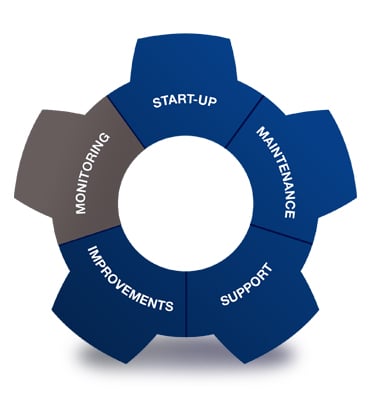Performance audit
Predict maintenance requirements
Knowing the actual operating performance of your equipment allows for optimized service intervals, which leads to increased production reliability and minimized costs.
Measurements are taken to accurately predict maintenance requirements and optimize service intervals. So you know which equipment requires maintenance, before performance is degraded to the point where product quality is affected or an unplanned shutdown occurs.
How it works
Our experts:
- Conduct a visual inspection of the installed equipment
- Check equipment operating parameters
- Get information about the usual maintenance and operation procedures of the equipment
- Provide a detailed report with findings and recommendations

Contact us
Gain more than you think when you regularly service your plate heat exchangers
If you can’t remember the last time you cleaned your gasketed plate heat exchangers, they could be underperforming—or even contaminated. Reconditioning your equipment as part of a regularly scheduled preventive maintenance plan can help to ensure your heat exchangers are in optimal condition, minimize unplanned downtime and prevent unnecessary energy costs.

Ten Top Tips to Keep your Plate Heat Exchanger in Tip Top Condition
1. Make sure that the operating conditions (temperatures and flow rates) comply with the design specifications.
2. At start-up, vent the heat exchanger but open and close the valves slowly to avoid pressure surges and water hammer.
3. Use upstream filters and strainers to remove particulate fouling and protect the heat exchanger.
4. On a daily basis check for any changes in temperature or pressure and check for any signs of external leaks.
5. On a regular basis keep the tightening bolts clean and well-lubricated.
6. Use Performance Audit to avoid having to open the plate heat exchanger for inspection.
7. Use Cleaning-In-Place (CIP) to avoid the need to open the heat exchanger for cleaning.
8. Always keep stand-by units clean and dry. If a heat exchanger is taken out of service, flush with fresh water and drain it completely.
9. Protect heat exchangers from water splash and rain. Avoid exposure to ultra violet rays and ozone typically generated from electrical sources.
10. Only use genuine spare parts for guaranteed performance, reliability and equipment life. Maintain a stock of essential spare parts and follow the storage instructions.
Learn more about keeping your Alfa Laval equipment in top condition.

